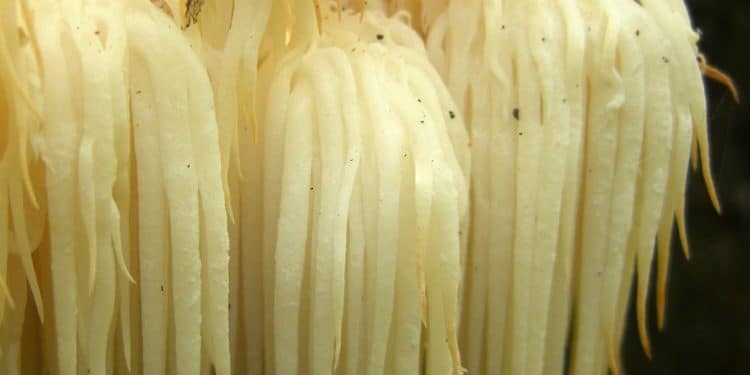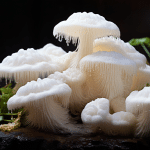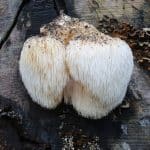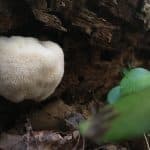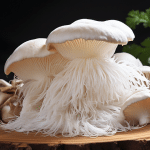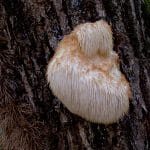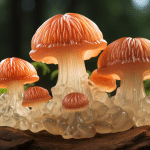We have been reading about lion’s mane as a treatment for depression in dozens of clinical trials. The good news: it appears that lion’s mane mushroom really does seem to help depression for a lot of people. Let’s get down to the details.
The health-promoting properties of this adaptogenic mushroom make it a popular choice for people looking for an alternative to conventional medicine or a way to enhance stress management.
Lion’s mane is unique among mushrooms because of the presence of its teeth, which resemble icicles, hanging down from a central stalk. It is a saprotrophic mushroom, meaning that it eats dead wood and helps decompose dead trees in the forest ecosystem.
What is Depression?
Depression is a common mental health condition that impacts how you feel, think, and act. This disorder may be acute, caused by external circumstances, or chronic, with no obvious cause. People with a history of mental illness in the family appear to have an increased risk for depression, as do people taking specific medications or struggling with alcohol or drug abuse. However, depression can strike with no apparent reason, at any time in life, and with different levels of severity.
How Common is Depression in Adults?
Depression is one of the most common mental health conditions, according to the World Health Organization, and about 5 percent of adults experience some type of this disorder. It is most common in men and adults over age 60, and is a leading cause of mental-health-related disabilities.
Typical Symptoms of Depression
Depression symptoms may differ widely among individuals. While some people might feel more anxious, others might be totally unresponsive. Some people are sleeping or eating more, and others are neither sleeping nor eating at all.
- loss of interest in day to day activities
- feeling helpless or hopeless
- sleep changes
- appetite changes
- loss of energy
- concentration problems
Does Lion’s Mane Mushroom Help With Depression?
Treating depression with conventional medications comes with its own set of problems, since those medications usually have a number of side effects. That is why researchers are starting to explore alternative treatments for depression and other mental health issues, and adaptogenic mushrooms are a particular area of focus. One of lions manes many medicinal benefits seems to be its ability to alleviate depression. Although little is known about the basic mechanisms behind the mushrooms ability to ease symptoms of mental health issues, including anxiety and depression, research in humans and animals is definitely promising in the field.
Studies of lions mane antidepressant effects suggest this mushroom dramatically ameliorates depression, and it may serve as an alternative to conventional antidepressants. A Japanese study investigated the effects of lion’s mane on symptoms of depression in menopausal women. After taking a lion’s mane supplement for 4 weeks, these women reported feeling less depressed than at the start of the study, whereas women taking the placebo did not report any improvements in symptoms.
Researchers are beginning to take a closer look at the potential mechanisms behind lion’s manes’ ability to help treat depression. A 2018 Taiwanese animal study examined the effects of erinaceous-enriched lion’s mane mushroom on the dopamine and serotonin production in stressed-out mice. The study concluded that lion’s mane “may be an attractive agent in treating depression”.
Stressed mice had lower levels of the neurotransmitters feel-good. In the Taiwanese study, the control group (those who were not given lion’s mane mushroom) showed a marked reduction in the production of dopamine and serotonin following stressor exposure.
Dopamine and serotonin are, as we all know, the “feel-good” neurotransmitters. Low levels of these are associated with depression, and high levels are associated with…feeling good.
So, exposure to constant stress makes these mice more susceptible to depression. Perhaps even more concerning, the “levels of interleukin (IL)-6 and tumour necrosis factor (TNF)-a were increased” in the control group following long-term stress. Elevated levels of both are usually associated with increased inflammation in the body. Inflammation serves valuable roles at a local level, for instance, to heal wounds, but is harmful when it is diffused and/or chronic within the body’s tissues.
Does Dopamine Effect Depression?
A study published in the Journal of Nervous Transmission investigated the effects dopamine may have on depression, concluding that although lack of dopamine may not be the sole cause of depression, it is definitely a contributing factor. The successful use of antidepressants that exert a dopaminergic effect supports this fact and calls for more studies.
Does Lion’s Mane Mushroom Increase Dopamine?
The primary purpose of lion’s mane mushrooms is to maintain a homeostatic state in the body, whether it means keeping your sugar levels low if they’re too high, or helping your body increase your dopamine levels if they happen to be low. Here’s how these healing mushrooms stabilize your dopamine levels, and how dopamine impacts depression. A 2018 study examined the potential mechanisms underlying lion’s mane mushrooms antidepressant effects in mice.
The results suggested that when mice are stressed, they have decreased levels of dopamine. However, after taking the lion’s mane, their dopamine levels leveled off, although there was no change in the level of stress. This suggests lions mane may be responsible for a dopamine increase, though more research on humans is needed.
Does Neurogenesis Alleviate Depression?
Studies have shown that the compounds hericenone and erinacine, which are found in the Lions Mane mushrooms, can potentially stimulate neural growth factor (NGF) and brain-derived neurotrophic factor (BDNF) proteins. Through NGF and BDNF protein production, the lions mane appears to help with neurogenesis and the proper development of nerve cells.
Neurogenesis, specifically in the hippocampus, appears to be one of the primary mechanisms behind the lions manes ability to alleviate symptoms of a variety of mental health issues, such as anxiety (for more, see our lions mane and anxiety article) and depression. The hippocampus is very responsive to stress, and it could be a central player in depressive disorders, according to research published in The Journal of Psychiatry and Neuroscience. Therefore, increased neural cells in the region could be associated with fewer serious symptoms of depression, and also with fewer cases of the mental disorder.
Lion’s Mane Mushroom and Hippocampal Neurogenesis
Animal studies have investigated the mechanisms behind the capacity of lion’s mane mushroom to decrease anxiety and depression-like behaviors in adult mice. The results showed the mushroom appears to contribute to the growth and development of hippocampus neurons. Mice given the lion’s mane extract for 4 weeks showed less signs of anxiety and depression compared with their control group, and hippocampal neuronal cells increased substantially.
Does Lion’s Mane Extract Alleviates Stress?
In a Taiwanese study, mice given extracts from lion’s mane responded quite differently than control groups under prolonged stress. While the “good” neurotransmitters were decreased and the inflammatory cytokines increased in the stress group control mice, the opposite was true in mice given lion’s mane extract. Not only were levels of serotonin and dopamine increased in the lion’s mane group, the inflammatory and stress responses were lower compared to the control group.
What We Can Conclude About Lion’s Mane and Depression
According to studies on humans and animals, lion’s mane has the potential to act as a natural antidepressant.
An animal study suggests the mechanism underlying the antidepressant properties of lion’s mane may relate to its ability to promote neurogenesis.
Stress typically causes depression by increasing inflammation and decreasing “feel-good” neurotransmitters like dopamine and serotonin. Lion’s mane helps mice cope with stress better, keeping levels of dopamine and serotonin high and reducing inflammation. We can speculate it might do the same for humans.
More studies in humans are needed to unravel the basic mechanisms underlying the lion’s mane interaction and its effects on depression.
Given the lack of drawbacks of taking lion’s mane, its relatively low cost, and high accessibility, it might make sense to incorporate the mushroom into ones diet as a means to reduce symptoms of depression.
You can find our favorite capsules, powders, and tincture’s on the following pages of our website and learn more about each individually:
Click here for Our Favorite Lion’s Mane Supplements
Click here for Our Favorite Lion’s Mane Powders
Click here for Our Favorite Lion’s Mane Tinctures
Click here for Our Favorite Lion’s Mane Gummies
Additional Resources:
Lion’s Mane With or Without Food
Where to buy lion’s mane mushroom
Updated 10/12/2022
